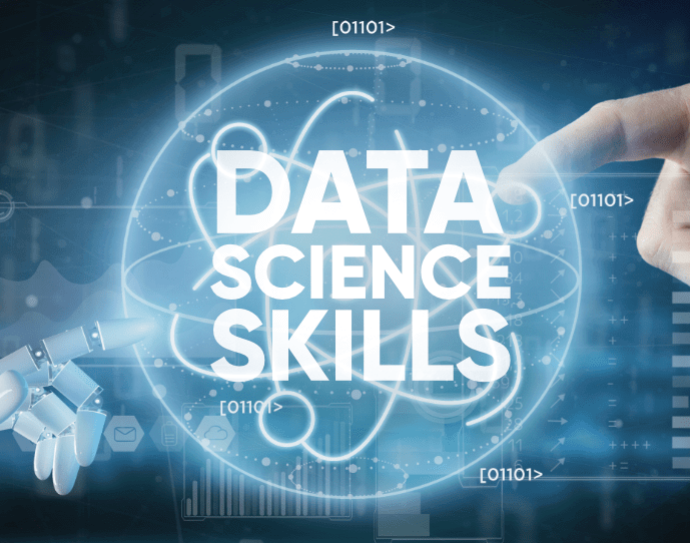The demand for data science professionals continues to surge as businesses across various sectors increasingly adopt data-driven strategies. With data science employment projected to grow by 36% from 2023 to 2033, mastering key skills in this field not only boosts your ability to drive insightful decisions but also opens up a wide array of career opportunities. In this blog, we’ll explore the ten most important data science skills every tech professional should master to stay ahead in this rapidly evolving industry.
Key Data Science Skills You Need to Master
Data science is a multidisciplinary field that blends statistics, programming, machine learning, and domain-specific expertise to analyze and extract valuable insights from large and complex datasets. As technology continues to advance, certain skills are becoming increasingly important for data professionals. Here are the top ten skills you should focus on to excel in data science.
1. Programming Proficiency
Proficiency in programming is essential for any data scientist. Mastering languages like Python and R is a must, while familiarity with others such as SQL, Java, and C++ is also beneficial. These languages are used for a variety of tasks, including data cleaning, analysis, and model development. Strong programming skills are crucial for roles like data scientists, machine learning engineers, and data analysts.
2. Data Manipulation and Database Management
Data manipulation and preparation are key aspects of data science. Cleaning and transforming raw data into a usable format requires expertise in tools like SQL and experience with database management systems. Data engineers and database administrators specialize in optimizing data storage, ensuring quality, and managing efficient data flow.
3. Statistical Analysis and Probability
A solid understanding of statistics and probability is foundational to data science. Concepts like hypothesis testing, regression analysis, and probability theory are at the heart of predictive modeling and data analytics. Skills in statistical analysis are essential for roles like data analysts, statisticians, and quantitative analysts, where supporting business decisions with data is a key responsibility.
4. Data Visualization and Communication
Effective data visualization is essential for presenting complex insights in a clear and actionable manner. Tools like Tableau, Power BI, and Looker are used to create compelling visualizations that make it easier for non-technical stakeholders to understand data. Data storytelling—using visual elements to convey insights—also plays a crucial role in roles such as data analysts, business intelligence analysts, and data journalists.
5. Machine Learning and Deep Learning Knowledge
Machine learning (ML) and deep learning (DL) are critical areas in data science. ML focuses on building algorithms that learn from data, while DL automates more complex processes through neural networks. Mastery of these technologies is crucial for professionals working in AI development, with roles such as machine learning engineers and AI researchers relying on these skills to develop advanced models for tasks like fraud detection, recommendation systems, and image recognition.
6. Data Engineering Expertise
Data engineers are responsible for creating the infrastructure that allows data to be collected, processed, and analyzed. This includes building and maintaining data pipelines, performing ETL (Extract, Transform, Load) operations, and ensuring data quality. Strong knowledge of data engineering is vital for ensuring that data scientists can access clean, structured data for analysis and model development.
7. Big Data Tools: Hadoop and Spark
Big data technologies like Hadoop and Spark are designed to handle and process enormous datasets. These distributed computing frameworks enable organizations to scale their data operations efficiently. Data professionals who specialize in big data technologies work to ensure that large datasets are managed effectively across systems, supporting advanced analytics and real-time processing needs.
8. Cloud Computing Skills
Cloud computing has become indispensable in the data science world, providing scalable infrastructure for storing and processing large datasets. Familiarity with cloud platforms like AWS, Google Cloud, and Azure is essential for modern data scientists. These platforms offer cost-effective, flexible solutions for data management and analytics, making them key to roles in data engineering, cloud computing, and DevOps.
9. Machine Learning Operations (MLOps)
MLOps combines machine learning with IT operations to ensure the successful deployment and monitoring of models in production environments. MLOps is about making machine learning workflows more efficient, enabling continuous integration and delivery (CI/CD) of models. Professionals in MLOps roles ensure that AI models remain up-to-date and operational, maintaining consistency and performance in real-world applications.
10. Data Ethics and Governance
Data governance and ethical considerations are becoming increasingly important as organizations collect more personal and sensitive data. Data ethics ensures that data is collected, stored, and used responsibly, complying with regulations like GDPR and CCPA. Professionals who understand data governance can ensure that data usage aligns with legal standards while also protecting customer trust.
Enhancing Your Data Science Skill Set
To stay competitive in the ever-evolving field of data science, continuous learning is key. Online courses, certifications, and master’s programs provide opportunities to deepen your technical expertise and stay updated with the latest tools and technologies. Practical experience is equally important—consider working on projects, collaborating with peers, or attending data science conferences to gain hands-on knowledge.
Additionally, soft skills such as communication, teamwork, and problem-solving are essential for advancing your career. Data scientists who can explain complex technical concepts to non-technical stakeholders and work effectively in cross-functional teams are more likely to succeed in leadership positions.
Conclusion
As data science continues to expand, mastering these ten essential skills will ensure that you remain at the forefront of the field. Whether you are analyzing large datasets, developing machine learning models, or managing data pipelines, these skills are crucial for navigating the future of data science. By honing these abilities, you can unlock exciting career opportunities and contribute to innovative solutions in various industries.


